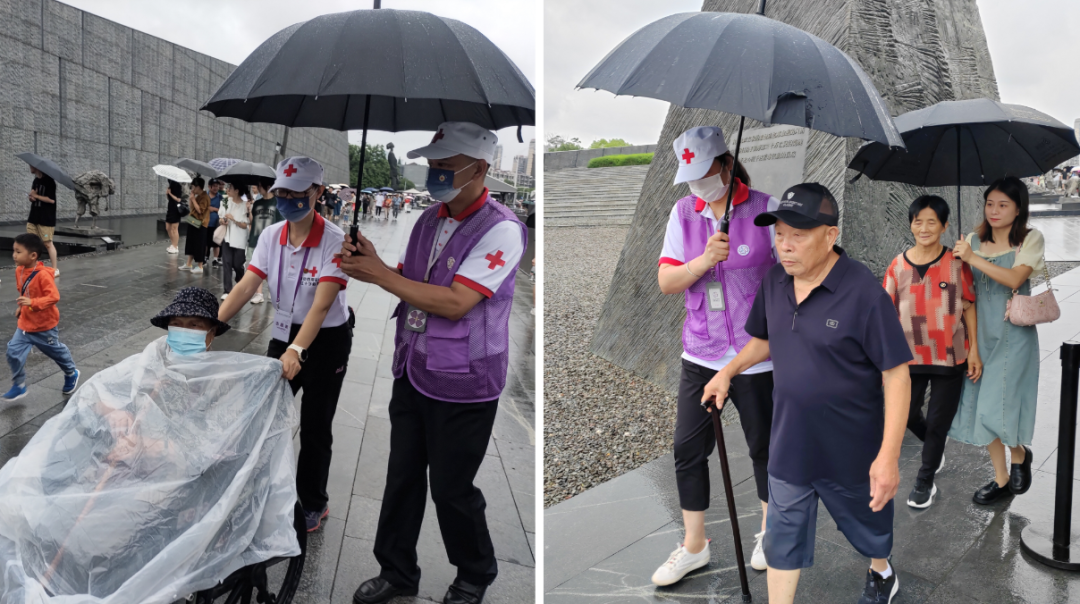Visitors Celebrated Patriotism at the Memorial Hall during Dragon Boat Festival Holiday
During the Dragon Boat Festival holiday, the Memorial Hall drew many visitors, from students wearing a red scarf, a symbol of the Chinese Young Pioneers, and foreigners holding white chrysanthemum in their hands, to elderly people in a wheelchair. During the holiday, the Memorial Hall extended its opening hours and adopted a range of measures to deliver better experiences, such as launching a green channel for vulnerable groups, getting a thumbs up from the visitors.
Let’s take a look back at some moving scenes at the Memorial Hall during the holiday.
Inherit·Patriotism
A large number of visitors chose the Memorial Hall as the first stop on their trip to Nanjing for the holiday, a place where they can have a close encounter with history. Many parents, wanting to set a good example for their children, took their children to the Memorial Hall and regarded the visit as an important lesson in their patriotic education.
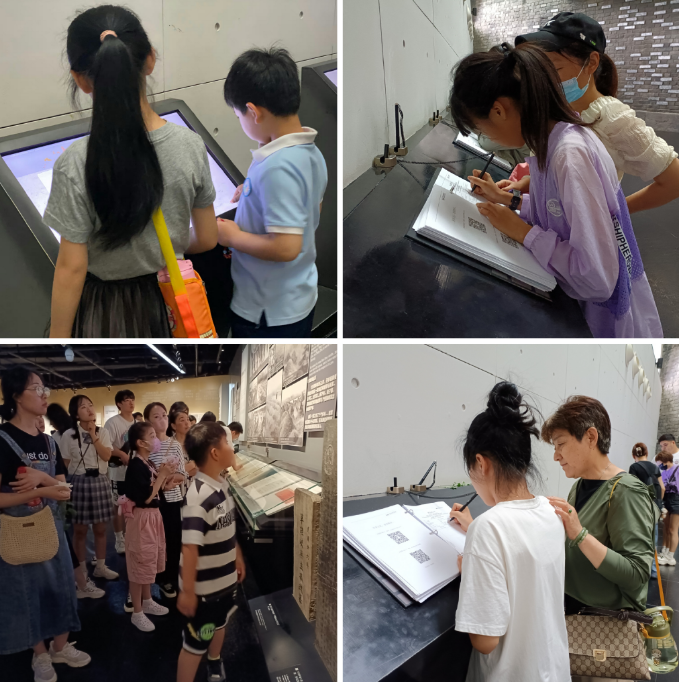
Eight-year-old son Hu Jialin visited the Memorial Hall together with his parents. The Grade-2 student just recently joined the Chinese Young Pioneers organization. Before entering the Memorial Hall, he put on his red scarf. “We come from Shanghai. We took him here to let him receive patriotic education and have an essential history lesson,” his mother said.
Bu Antong, a primary school student from Hefei, Anhui left a message on the comment book, “Never forget national humiliation and forge ahead! Make a contribution to building a thriving and prosperous country.” Before submitting her message, she added that she is Chinese in parentheses. “I used new Chinese phrases I learned while writing the message. And I want others to know the message is written by a Chinese. I want them to know Chinese people love their country and will never forget history.”
In front of a wall full of messages of peace, another primary school student Chen Jinxuan looked carefully at a message: “I hope the world will be free from the threat of war and destruction. Looking forward to living in a peaceful world.” She asked her mother to take a photo of the message with her mobile phone because she planned to write the message into her weekly diary. “I love my country. I will remember the history of my country. Only when you are strong will you be able to say no to the bullies,” she said.
“Mom, can you lift me up? I want to see it more clearly,” a boy said to his mother in front of a container that keeps the mud from one of the burial sites of the victims of the Nanjing Massacre. “I took him to the Memorial Hall to foster his patriotism and encourage him to be a self-reliant and strong person,” his mother said.
Mrs Wang stood in front of a sculpture named Bombing, holding her five-year-old daughter in her arms. “The sculpture depicts a mother running to protect her children from danger. Seeing it, I could imagine how helpless the mother felt at that time. As a mother, I hope the children could grow up in peace.”
Spread·World Memory
During the holiday, some foreigners walked into the Memorial Hall to pass on the world memory of the Nanjing Massacre.
Among them was a German whose wife is a native in Nanjing. Through his wife, he learned about Nanjing and its history. He was shocked beyond words to witness the bloody history at the Memorial Hall. He also learned about how people helped each other during war.
Miro from Bulgaria thinks the Memorial Hall is a very educational venue. Miro once watched the movie based upon the diaries of John Rabe, a German businessman who risked his life to protect Chinese people during the Nanjing Massacre. The visit to the Memorial Hall proved fruitful. Miro was shocked at the history and hoped the painful history will never be repeated again.
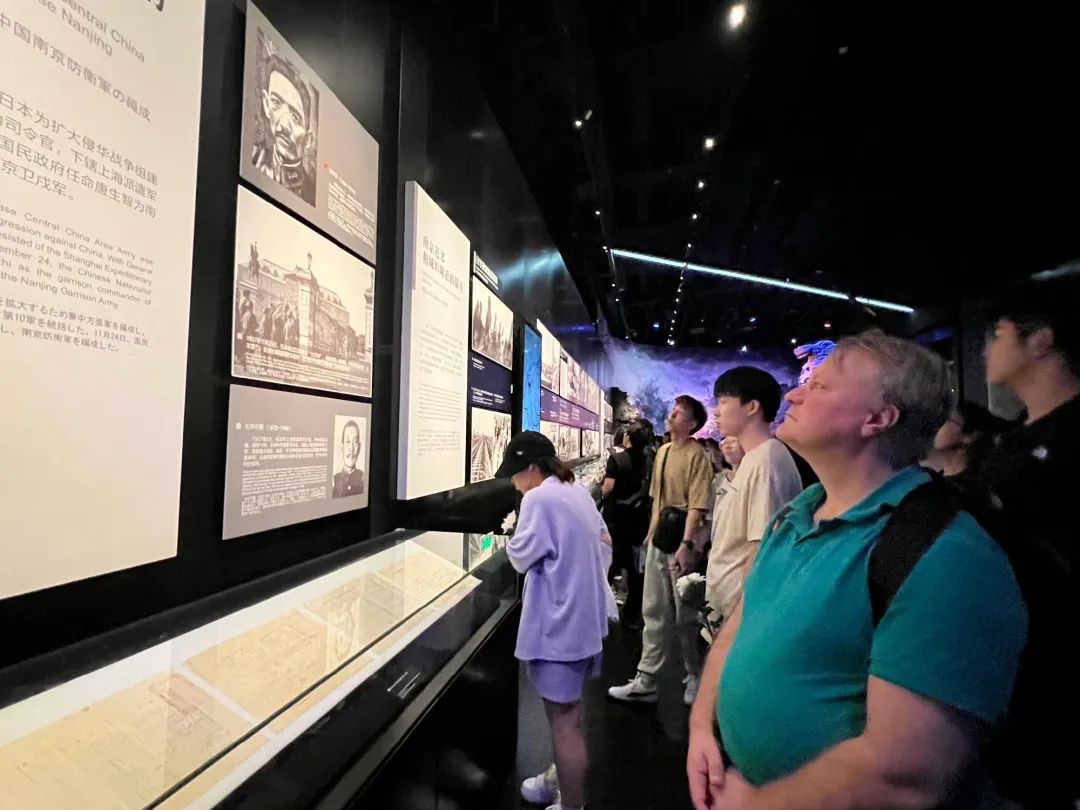
Aleksandr and Evgeniy were on a business trip to China during the holiday. They specially set aside time to visit the Memorial Hall. Both of them have read about the history of the Nanjing Massacre in books, and were deeply shocked after the visit. Evgeniy said the Memorial Hall is a place where people visit with a heavy heart, and the exhibits are impressive. He called the Nanjing Massacre a huge tragedy in human history.
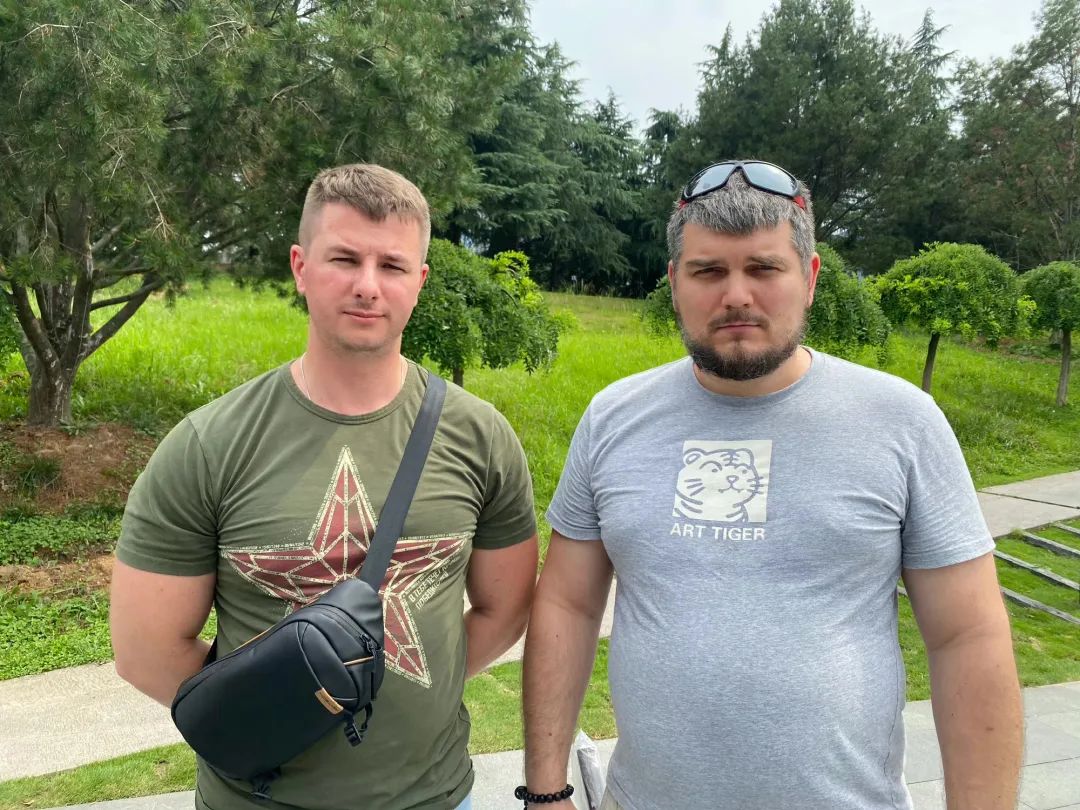
Deliver·Considerate Services
During the holiday, the Memorial Hall extended its opening hours and offered special services to vulnerable groups. More than 30 Zijin Cao volunteers were on duty every day and nearly 100 Memorial Hall staff members served visitors on the front line.
Yu Lulin is an old man having difficulty in walking. With the help of volunteers including Zhao Lin and Jiang Lingye, Yu was offered a wheelchair and entered the Memorial Hall through the green channel, with no reservation required. Then, other volunteers helped take him to the exhibition hall. “Originally I thought my physical condition would make the visit hard. But your services are so nice. I’m very touched!” he said.
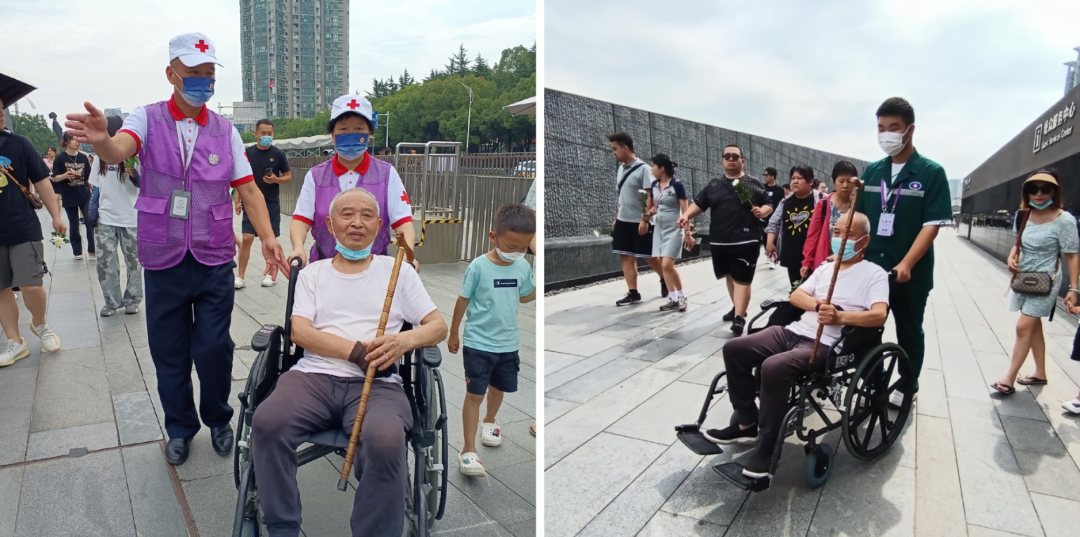
On June 23, 36 deaf-mute visitors with an average age of 60 came to the Memorial Hall. The Memorial Hall launched the green channel for them. In the exhibition hall, the guide showed them around in sign language. “They are very excited. They all want to learn about the history at close range,” said Ms Jiang, daughter of one of the visitors.
Standing in front of the statue of John Rabe, volunteer Sun Yumin recited an excerpt from The Diaries of John Rabe together with some visitors. Sun graduated from high school this year and signed up to be a volunteer at the Memorial Hall after the national college entrance exam ended. “I want to go to a police college and become a people’s police to protect my home and defend my country.” May he get a good grade!
Cheng Ruyi and Huang Meiqian took part in the recitation. They are students from the Clinical College of Anhui Medical University. “In the future, we hope to use what we learned to save lives and help more people, just like these international friends.”
At the service window for reservation-free visitors, three staff members were busy working. Yang Xiaoting, a post-00 girl, was one of them. “The weather was hot during the first two days of the holiday. We provided special services to reduce wait times and facilitate the entry of groups including children, elderly people, military servicemen and veterans.”
A light rain fell on the third day of the holiday, but it didn’t stop people from going out and visiting the Memorial Hall. The staff members of the Memorial Hall immediately cleared away water on the ground to ensure safe access to the Memorial Hall. The volunteers prepared wheelchairs for visitors with difficulty walking in a timely manner and led them into the Memorial Hall through the green channel.
